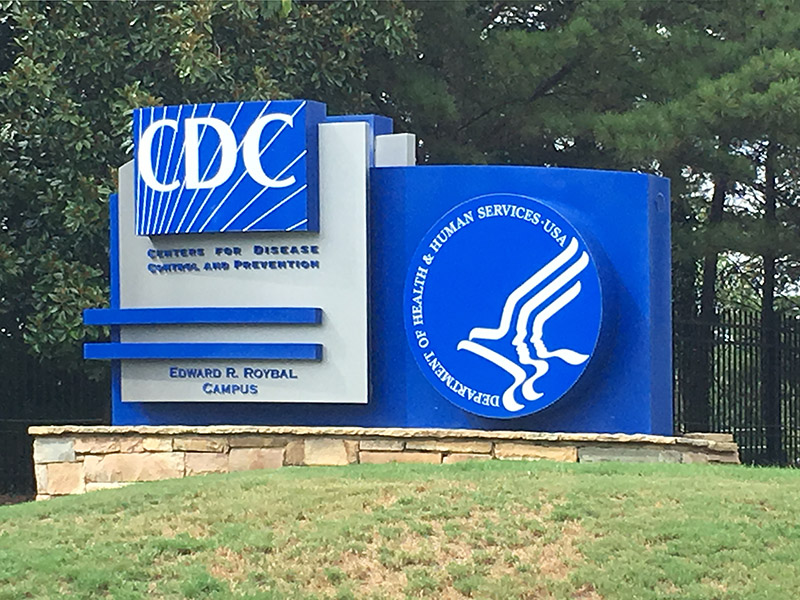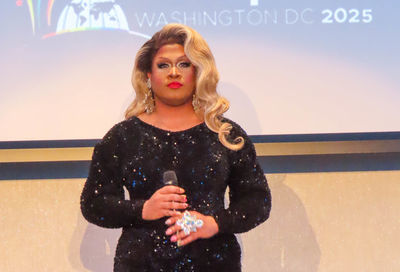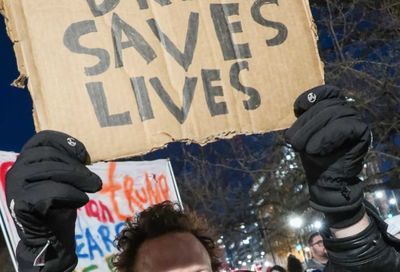Running for Change: Sarah McBride is Ready to Make History
LGBTQ activist Sarah McBride has spent her life fighting for others. Now she's taking her political fight to the next level.

“Our democracy is at its best when government includes the voices of all of us, when everybody matters and everybody has a seat at the table,” says Sarah McBride. “And our government is best when we have elected officials who look like the communities they are seeking to represent.”
If that sounds like the makings of an elected official, you’d be right. The national press secretary for the Human Rights Campaign, McBride has spent her life fighting for the rights of others — and, as a transgender woman, herself. Now, she’s ready to take that fight to the next level.
It’s why she’s throwing her hat into the ring for a seat in the Delaware General Assembly, running for the district currently represented by Democratic State Senator Harris McDowell, retiring after 44 years in office. Born and raised in western Wilmington, Del., McBride is quite familiar with the district, which includes parts of Wilmington, Bellefonte, and Claymont. And while she’s enjoying the campaign trail, particularly canvassing and knocking on doors — “The best part, absolutely, is getting to meet people and getting to know my neighbors even better” — McBride already has her eyes set far beyond election day in 2020.
“Elections are invigorating and exciting, but winning an election is not the end of the hard work,” she says. “It’s the beginning of the hard work. I’m eager to have the opportunity to work hard, and work with those who I hope to be my colleagues in the General Assembly, to effect change. I’m eager to hopefully get there and do the hard work to make change.”
Throughout her 28 years, McBride has amassed an impressive resumé, including time as a White House intern under President Obama, stints working on behalf of Democratic candidates in Delaware, at the liberal think-tank the Center for American Progress, and for local and national LGBTQ rights organizations, serving as a board member of Equality Delaware and in her current role as the national press secretary for the Human Rights Campaign. Over the years, she’s been the subject of glowing profiles in some of the nation’s top newspapers and magazines, and has earned several awards and honors, including, most notably, a speaking slot at the 2016 Democratic National Convention, making her the first openly transgender person to address a major political party’s convention.
“Throughout all of this it’s never been about the positions, the platforms, or the titles,” McBride says. “It’s always been about trying to make change, trying to move the ball forward on a whole host of issues that I care about and that I’ve fought for. I think that at the end of the day, voters will see a candidate who throughout her life has fought for what she believes to be right, and has had the courage and the authenticity to fight for those principles, to fight for those values. I think that’s what they’ll want in a State Senator.”
Those values have been shaped partly by her life’s work as an activist, and partly by her deep, meaningful relationships with those who have been closest to her, including her parents and her late husband, Andrew Cray, who died at the age of 28 from cancer, mere days after the couple wed in 2014.
“For me, the most formative experience in my life is not my identity, it’s my relationship with Andy and in particular my role as a caregiver to Andy throughout his battle with cancer,” says McBride. “I had never met anyone like Andy, and still haven’t. He was the kindest, smartest, funniest, goofiest, person I think I’ve ever met. Andy was someone of unparalleled kindness. Everything he did, kindness was at the heart of his actions and his beliefs.
“He was someone who taught me a lot, and knowing and loving Andy left me profoundly changed. He taught me how to love and be loved,” she continues. “Every single day I wake up, every decision I face, every dilemma I encounter, I question what would Andy do. He was that kind of person, and I think about him pretty much every hour of every day, and would give anything to have him with me. More than anything else, my relationship with Andy underscores to me that change cannot come fast enough.”
Learning from her own experience that life is short and time is precious, McBride vows to bring an activist’s sense of urgency to the problems she will try to solve if elected to public office.
“I think when you’re a woman who’s running [for office], if you’re LGBTQ, if you’re someone who grew up in the middle class — regardless of what your background is — you understand the urgency of change,” she says.
“You understand that these are policies that impact people on a day-to-day basis in their own lives, and that when we ask women, or working people, or people of color, or LGBTQ people, or anyone to sit back and allow for a slow conversation to take place before we ensure them opportunity and dignity, we are asking people to watch their one life pass by without the respect and fairness that everyone deserves. That’s too much to ask of anyone.”
Should she win, McBride would be the first transgender person elected to the General Assembly, the only LGBTQ person currently serving, and only the second LGBTQ person to ever serve in the state’s history, following in the steps of the now-retired Sen. Karen Peterson (D-Stanton). But every day that McBride knocks on the doors of her neighbors and talks with would-be constituents, she reaffirms her belief that her gender identity will not be a hindrance in her campaign.
“I am seeing what I’ve already known to be true, that the community recognizes that our differences are our strengths, that our diversity is our beauty, that we judge people on their merits, on their skills, on what they bring to the table and on their kindness, not on their identities,” she says. “At the end of the day, for voters, this campaign isn’t about my gender, it’s about what we can do together to make change and to build a community where no one gets left behind. That is heartening to see.”
METRO WEEKLY: Let’s talk about your background and family life.
SARAH MCBRIDE: I always say I lucked out in the parent lottery, I’ve got two incredible parents, David and Sally McBride. They still live in the house I grew up in, in west Wilmington, in the First Senate District. I have two older brothers, Shawn and Dan. Shawn is ten years older than me, Dan is eight years older than me. Shawn lives up in New York with his husband Blake, and Dan lives in Delaware with his wife Jamie and their brand new baby.
I was very lucky in a number of different ways. I was born and raised in a loving, supportive family. I was born and raised into opportunities that allowed me to get a quality education, both K-12 and then at American University. I was born and raised in a family that taught us from an early age that we should care for one another and look out for one another. I was born and raised in a family that was civically engaged, where we were talking and debating around the dinner table many nights. I think in many ways the values that I was raised in, the values of hard work and compassion, are the values that guide me in so much of what I do.
MW: When did you first realize your true identity, and what was your coming out process like?
MCBRIDE: I’ve known who I am for as long as I can remember. Some of my earliest memories were of lying in bed at night, praying I would wake up the next day and be myself, that my family would still be proud of me, and that my community would still have a place for me.
As a young person, I was a voracious reader of history. As I read history books, at the same time that I was becoming aware of the fact that there was something about me that society didn’t necessarily didn’t approve of, I would marvel at the scope of social change that filled those history books’ pages. It was such a clear path toward a world of expanded opportunity and dignity for more people, and I hoped one day that could include me and people like me.
I also became very aware that no one like me had ever made it very far, at least no one who was out. I wondered whether the heart of this country was big enough to love someone like me. So I kept my gender identity inside.
It wasn’t until I was at American University, during my term as student body president, that I finally gained the courage, confidence, and insight to finally come out. It was on Christmas Eve, sitting in my church in Wilmington, in Westminster Presbyterian Church, listening to the choir singing and looking up to the stained glass windows, that I recognized I couldn’t spend one more day missing the beauty in this world and watching the world pass by me as someone that I wasn’t. So I came out to my parents the next day, on Christmas Day, in 2011, and then I came out to my close friends during the following weeks and eventually came out to my communities both at American and back in Delaware as transgender, in a personal note on Facebook and then in the student newspaper.
MW: What did it feel like to hide your true identity?
MCBRIDE: One of the challenges we have is that people who aren’t transgender can’t understand what it feels like to have a gender identity that’s not seen and affirmed by society. For me, it felt like a constant feeling of homesickness, an unwavering ache in the pit of my stomach that would only go away when I could be seen and affirmed as myself. Growing up, I think in many ways I could compartmentalize, but that homesickness was nearly ever present. The fear of my dreams and my identity being mutually exclusive, my dreams of coming home and welcomed home in Delaware, of starting a career and starting a family in the state that I love, and the fear that it was mutually exclusive with who I am, was something that I thought about nearly every waking hour of every single day.
One of the great things for me, one of the reasons why I am as hopeful and optimistic as I am, is that I have seen firsthand that those fears, while understandable, were unfounded. The community that I have always loved is a community that has embraced me and supported me through all of the different parts of my life. One of the reasons why I’m so optimistic and one of the reasons why I’m so passionate about this community is I’ve seen first hand that it is a big-hearted community that has demonstrated that even the smallest places can be big enough for everyone.
MW: You were a 2014 Metro Weekly Next Generation Award winner, you were given a prime speaking slot at the Democratic National Convention, you’ve had a number of big awards or big honors bestowed upon you. If you could pick one of your many accomplishments, which one makes you most proud?
MCBRIDE: The work that I’m most proud of is the work that we did [in Delaware] to pass the Gender Identity Non-Discrimination Act of 2013. When we set out to do that, few people thought it was possible, particularly since we were fighting for both marriage equality and nondiscrimination protections at the same time. But I, along with fellow advocates in Delaware, recognized the urgency of these issues, and recognized that with hard work we could make the impossible possible, and we did in 2013. That’s without question the work I’m proudest of because it’s also the work that very clearly changed things for the better for my neighbors. I’ll bring that commitment to change, that sense of urgency, to all of the issues that I work on as a state senator.

MW: What prompted you to run for political office?
MCBRIDE: A number of different factors led me to decide to run for state senate. The first is that this district, the First District, is the one I was born and raised in. It’s the community that helped shape me into the person that I am, and it’s the community that helped support me and sustain me through some of the most difficult times in my own life.
It’s a great community, and I’ve seen it at its best demonstrating the values of kindness and support and care for one another. I want to make sure that I give back to this community, and help us live up to our values as a state of neighbors.
I’m running for the state senate to make sure that we expand access to health care for more Delawareans, to ensure that more working families are able to access paid family medical leave, to help reform our criminal justice system, and to do so much more to make sure that I’m giving back to this community that has offered me so much throughout my life.
Secondly, at the end of the day, this is a critical moment in our politics. One of the things I’ve seen throughout my work in the Human Rights Campaign is that most of the decisions that impact people’s daily lives are made at the state level. State legislatures are where the rubber meets the road when it comes to public policy. And I could no longer fight from the sidelines at this critical moment in our politics. I decided that if I wanted to see a change, as proud as I am of the work that I’ve done, I had to throw my hat in the ring and run for this seat so that I could contribute from the Delaware State Senate.
MW: What specific issues are you going to be focused on during the campaign?
MCBRIDE: At the end of the day, my neighbors are concerned about making sure that we have an economy that works for everyone, they’re concerned about being able to access affordable, comprehensive health care, they’re concerned about having to give up a day’s wages in order to take care of a sick child. They’re concerned about the criminal justice system that doesn’t currently serve everyone equally. They’re concerned about the kitchen table issues that I hear about every single day growing up in the community and every single day now that I’m a candidate running for the state senate. Those are going to be my priorities.
MW: Are there any big-ticket items Delaware voters are talking about that haven’t yet been accomplished?
MCBRIDE: That there’s a whole host of different issues. We’ve seen important progress on criminal justice reform: there’s a package of nearly 20 bills supported by the Attorney General, about 11 of them were passed this session. My hope is that we can continue to move forward and pass the remaining bills, and move beyond that to additional reforms that are still needed.
We’ve seen important progress in expanding access to paid family leave for state employees. I’d like to see us continue on that progress and expand that program to include medical leave and to hopefully expand access to paid family and medical leave to more and more working families. Of course, we’ve seen important progress on expanding access to health care, but I want to make sure we continue to move the ball forward. Particularly when it comes to bringing down premiums and avoiding surprise medical bills for families throughout the state.
MW: Have you had experience with medical debt?
MCBRIDE: Yes. It’s part of what’s fueling me. One of the most formative experiences of my life was being a caregiver and being by Andy’s side, not just through his treatment but through his fights with the hospital and insurance company, through his fears, through all of it.
MW: Andy was your husband. Let’s pause here for a moment. Tell us about him.
MCBRIDE: Andy and I first met at a 2012 Pride Reception at the Obama White House. I had just come out publicly as student body president of American University, and we bumped into each other. I’m ashamed to say I don’t remember bumping into Andy, but he remembered bumping into me. He reached out to me a few weeks later over Facebook and sent an adorable message that he’d thought we’d get along swimmingly. I thought, “Who the hell says the word swimmingly?” But it’s someone I want to spend some time with. So we went out in the late summer of 2012, and started dating. I will say that things moved a little slower than either of us would have liked at first, because I was at the White House and my hours were basically 6 a.m. until 11 p.m. every day.
Once my time at the White House was over, we became attached at the hip and quickly fell in love with each other. We moved in with each other, and shortly after we moved in we started working together at the Center for American Progress. Then, a little over a year after we first started dating, and about a year-and-a-half after we met, Andy was diagnosed with cancer.
MW: And this is where the medical debt comes into play.
MCBRIDE: Yes, and I’ll share this one particular example. In the final month of Andy’s life, the cancer spread from his tongue to his lungs. One of the reasons we realized the cancer was back and had spread was because Andy had developed a persistent cough. Over time it was becoming not just a persistent cough but very difficult to breathe. That was in part because the fluids that had been secreted from the tumors were filling up the cavity in his chest around his lungs. The only way for Andy to be able to breathe was for him to undergo an emergency procedure to drain the fluid from his chest cavity. This was a procedure done very quickly, it was done by a doctor who was in-house at the hospital.
Shortly after Andy died, I’ll never forget getting a bill for thousands of dollars for that emergency lifesaving procedure. In that case, he had good comprehensive health insurance, but because, without our knowledge, the doctor who was working at this hospital did not accept insurance, I had to pay the hospital bill upfront, and then haggle with the insurance for some kind of reimbursement. But to have the life-saving procedure done, and to assume, with the good health insurance he had, that it would be covered, only to find out that I was on the line of thousands of dollars after Andy died, that’s a profound example of the system coming up short.
The experience that I had is just a glimpse into the experiences that far too many people have. For those who have good health insurance, those who are underinsured, and those who have no insurance, medical debt remains a significant contributor to personal debt and personal bankruptcy. In a country as prosperous as ours, no one should have to go into debt, no one should have to declare bankruptcy simply for trying to save their own life or the life of a loved one.
MW: In recent years, transgender candidates have not only begun running for office, but have won races for state legislature, starting with Danica Roem’s win in 2017.
MCBRIDE: I find so much inspiration and empowerment from Danica and, now, the class of four openly transgender state legislators across the country. They demonstrated that when transgender candidates run, they can win. And what I’ve already seen, in particular over the last few weeks, is that voters don’t care about my gender. Voters care about whether I’m going to fight for them. Voters care about expanding access to health care and building an economy that works for everyone. Voters care about being able to take care of loved ones if they get sick. We saw that in Danica’s race, and I think we’ve seen that in other races. I’m already seeing it in this race — voters want a state senator who will fight for them, regardless of their gender.
MW: What other political figures do you take inspiration from?
MCBRIDE: I’ve worked for both former governor Jack Markell and former Attorney General Beau Biden, who unfortunately passed away a couple years ago. Both of them are and were mentors, friends, and leaders who helped to open the doors of opportunity to so many young people in politics, myself included.
I will always be grateful to have turned 18 [and] been able to cast my first vote in my life for Barack Obama. I will always and forever be grateful to have been able to work in the Obama White House as an intern and to work with the Obama White House as an advocate. Barack Obama is a towering figure in my life, as he is in the lives of so many millennials involved in politics and advocacy in government. He is someone, I think, who called on us to exhibit our best selves, not just in politics but in our daily lives.
MW: How would you categorize yourself, in terms of where you fall on the ideological spectrum?
MCBRIDE: I consider myself as a progressive. I consider myself someone who wants to continue moving our communities forward. I’m someone who believes in change, someone who believes that change is necessary for us to grow and sustain the communities that we love. I’m someone who has long been involved in the Democratic Party, and like I said, I consider myself progressive. I consider myself a progressive who has a track record of success.
MW: Do you think that’s going to come up, either for good or bad in the primary, if you face one?
MCBRIDE: At the end of the day, voters, including primary voters, want someone who has the courage to act, who is clear about their principles. I’ll continue to be clear about my principles moving forward, and I’ll continue to demonstrate that I’m someone who has the courage to act, to make change. I think that’s what voters care about.
MW: How does it personally make you feel when you hear comments like those made by President Trump, such as, “If you don’t like America, then leave” or “Go back to where you came from”?
MCBRIDE: First off, I think we have to explicitly and vocally reject and denounce the racism of so much of what Donald Trump has said, including those tweets and comments. They are offensive, they are harmful, and they are racist. And I think we have to be clear about that.
Too many people in this country wonder whether the heart of this nation is big enough to love them, too. America is a nation that is built on a creed, which is that everyone matters, which is that every person counts. It is a creed that we have not lived up to throughout too many parts of our history, but the story of this country is a story of an ever-perfecting median and a march toward an expanded understanding of “We the People.” Donald Trump is seeking to stand in that way and is seeking to roll back the clock on some of the precious progress we’ve made as a country.
One of the things that I love about Delaware, and one of the reasons why I’m so passionate about my home state, and I’m so excited about running for the Delaware State Senate, is that we are a state of neighbors. Delaware at its best is a state where people exhibit the kind of values of kindness and care for one another, where we look out for each other, where we recognize that we are each other’s keepers.
Too many of our neighbors still feel left behind, still do not feel included in that moniker of being a state of neighbors. One of the reasons that I’m so excited about running is because I believe that no one is better suited to build a community where no one gets left behind than a state of neighbors. That’s the story of Delaware, that’s the story of this country, that while we have never lived up to the basic creed of this nation, our story has been one of a consistent and constant march toward that basic principle.
MW: Given that you’ll be on the ballot in 2020, do you worry about being overshadowed by the presidential race, the Delaware governor’s race, or other statewide offices? If so, how do you keep people engaged so that they’ll not just turn out for those races, but come out to support you specifically?
MCBRIDE: I’m confident that my neighbors see what I’ve seen, which is that the General Assembly is where the rubber meets the road when it comes to decisions that matter to people. I’m confident that the residents of the First District feel and understand what I have come to see, which is that most of the decisions that impact us are made in Dover, by the General Assembly.
I also think that this campaign is not about me. It’s about the voters, it’s about the residents of the First District. I think that when you make a campaign that’s not about a single candidate, that’s about every person in the community, I think that’s the kind of campaign that empowers, excites, and brings people out. That’s the kind of campaign I intend on running over the next year-and-a-half.
For more information about Sarah McBride and her campaign, visit www.sarahmcbride.com.
Support Metro Weekly’s Journalism
These are challenging times for news organizations. And yet it’s crucial we stay active and provide vital resources and information to both our local readers and the world. So won’t you please take a moment and consider supporting Metro Weekly with a membership? For as little as $5 a month, you can help ensure Metro Weekly magazine and MetroWeekly.com remain free, viable resources as we provide the best, most diverse, culturally-resonant LGBTQ coverage in both the D.C. region and around the world. Memberships come with exclusive perks and discounts, your own personal digital delivery of each week’s magazine (and an archive), access to our Member's Lounge when it launches this fall, and exclusive members-only items like Metro Weekly Membership Mugs and Tote Bags! Check out all our membership levels here and please join us today!
























You must be logged in to post a comment.